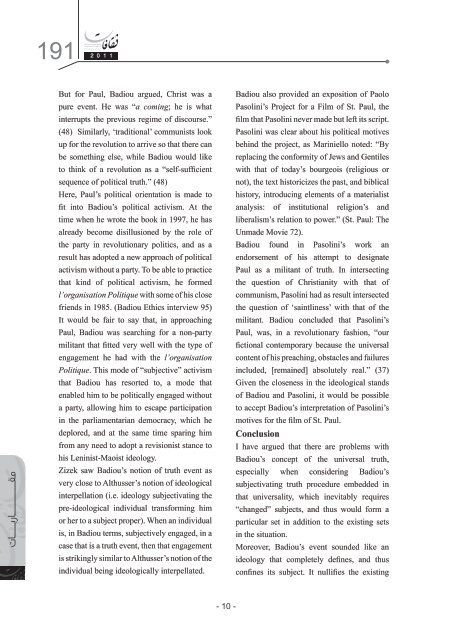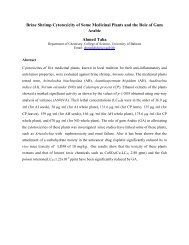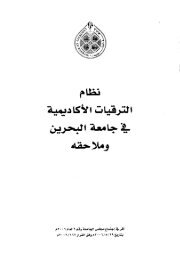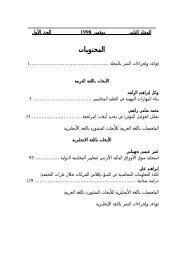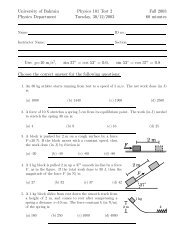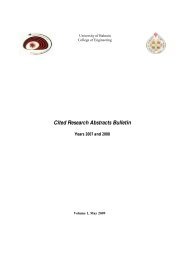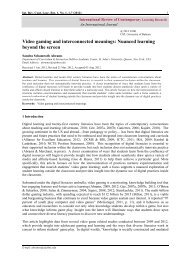د. ÙÙا بÙت عÙ٠اÙÙعÙ٠٠د. ÙÙÙÙÙÙÙÙادر ÙاظÙÙÙÙÙÙÙÙ٠د. ج٠ا٠... - جا٠عة اÙبØرÙÙ
د. ÙÙا بÙت عÙ٠اÙÙعÙ٠٠د. ÙÙÙÙÙÙÙÙادر ÙاظÙÙÙÙÙÙÙÙ٠د. ج٠ا٠... - جا٠عة اÙبØرÙÙ
د. ÙÙا بÙت عÙ٠اÙÙعÙ٠٠د. ÙÙÙÙÙÙÙÙادر ÙاظÙÙÙÙÙÙÙÙ٠د. ج٠ا٠... - جا٠عة اÙبØرÙÙ
You also want an ePaper? Increase the reach of your titles
YUMPU automatically turns print PDFs into web optimized ePapers that Google loves.
191<br />
2 0 1 1<br />
مقاربات<br />
But for Paul, Badiou argued, Christ was a<br />
pure event. He was “a coming; he is what<br />
interrupts the previous regime of discourse.”<br />
(48) Similarly, ‘traditional’ communists look<br />
up for the revolution to arrive so that there can<br />
be something else, while Badiou would like<br />
to think of a revolution as a “self-sufficient<br />
sequence of political truth.” (48)<br />
Here, Paul’s political orientation is made to<br />
fit into Badiou’s political activism. At the<br />
time when he wrote the book in 1997, he has<br />
already become disillusioned by the role of<br />
the party in revolutionary politics, and as a<br />
result has adopted a new approach of political<br />
activism without a party. To be able to practice<br />
that kind of political activism, he formed<br />
l’organisation Politique with some of his close<br />
friends in 1985. (Badiou Ethics interview 95)<br />
It would be fair to say that, in approaching<br />
Paul, Badiou was searching for a non-party<br />
militant that fitted very well with the type of<br />
engagement he had with the l’organisation<br />
Politique. This mode of “subjective” activism<br />
that Badiou has resorted to, a mode that<br />
enabled him to be politically engaged without<br />
a party, allowing him to escape participation<br />
in the parliamentarian democracy, which he<br />
deplored, and at the same time sparing him<br />
from any need to adopt a revisionist stance to<br />
his Leninist-Maoist ideology.<br />
Zizek saw Badiou’s notion of truth event as<br />
very close to Althusser’s notion of ideological<br />
interpellation (i.e. ideology subjectivating the<br />
pre-ideological individual transforming him<br />
or her to a subject proper). When an individual<br />
is, in Badiou terms, subjectively engaged, in a<br />
case that is a truth event, then that engagement<br />
is strikingly similar to Althusser’s notion of the<br />
individual being ideologically interpellated.<br />
Badiou also provided an exposition of Paolo<br />
Pasolini’s Project for a Film of St. Paul, the<br />
film that Pasolini never made but left its script.<br />
Pasolini was clear about his political motives<br />
behind the project, as Mariniello noted: “By<br />
replacing the conformity of Jews and Gentiles<br />
with that of today’s bourgeois (religious or<br />
not), the text historicizes the past, and biblical<br />
history, introducing elements of a materialist<br />
analysis: of institutional religion’s and<br />
liberalism’s relation to power.” (St. Paul: The<br />
Unmade Movie 72).<br />
Badiou found in Pasolini’s work an<br />
endorsement of his attempt to designate<br />
Paul as a militant of truth. In intersecting<br />
the question of Christianity with that of<br />
communism, Pasolini had as result intersected<br />
the question of ‘saintliness’ with that of the<br />
militant. Badiou concluded that Pasolini’s<br />
Paul, was, in a revolutionary fashion, “our<br />
fictional contemporary because the universal<br />
content of his preaching, obstacles and failures<br />
included, [remained] absolutely real.” (37)<br />
Given the closeness in the ideological stands<br />
of Badiou and Pasolini, it would be possible<br />
to accept Badiou’s interpretation of Pasolini’s<br />
motives for the film of St. Paul.<br />
Conclusion<br />
I have argued that there are problems with<br />
Badiou’s concept of the universal truth,<br />
especially when considering Badiou’s<br />
subjectivating truth procedure embedded in<br />
that universality, which inevitably requires<br />
“changed” subjects, and thus would form a<br />
particular set in addition to the existing sets<br />
in the situation.<br />
Moreover, Badiou’s event sounded like an<br />
ideology that completely defines, and thus<br />
confines its subject. It nullifies the existing<br />
- 10 -


